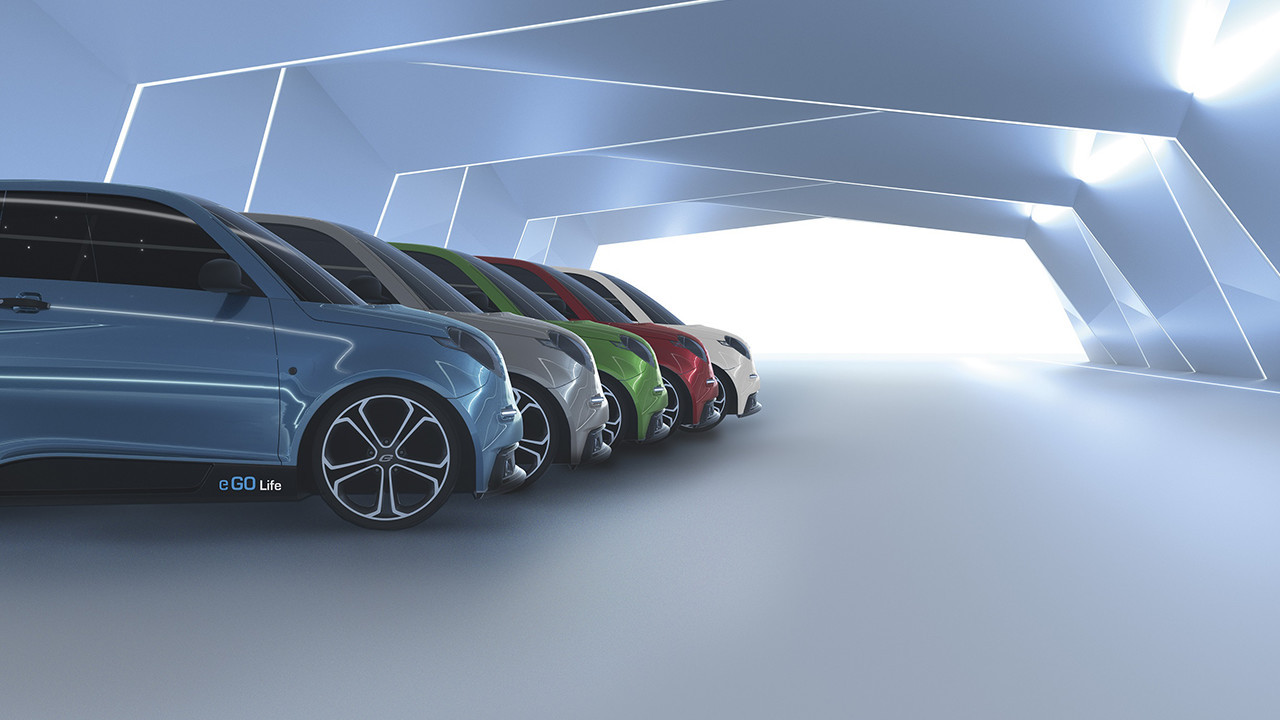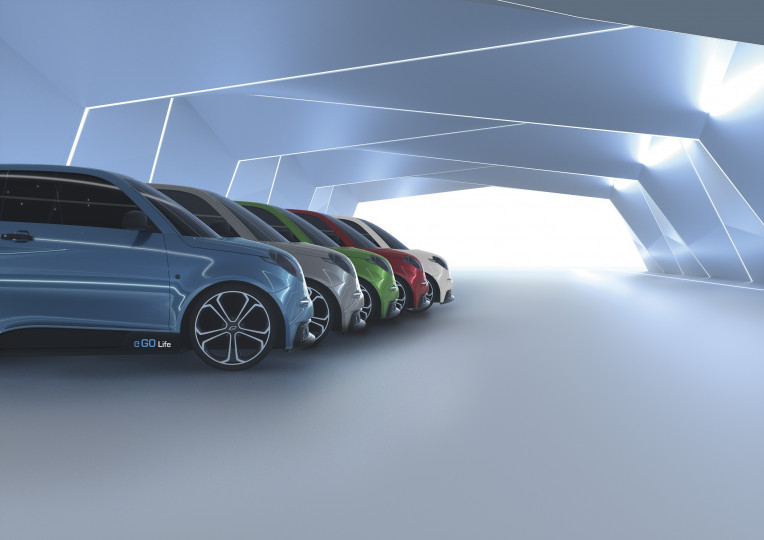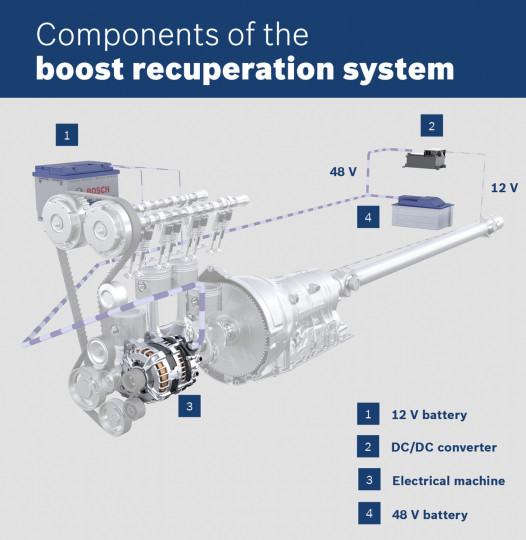In Bosch’s vision, urban electromobility is not all about greater size and range. There is little need for these in cities, where journeys are usually short and users typically travel less than 40 kilometres a day. Small electric vehicles cut through the traffic more easily, are cheaper to run, produce less noise and harmful emissions, and fit into the smallest parking spaces.
Visitors to the Bosch Mobility Experience 2017 event in Boxberg tried out Bosch’s latest ideas for the future of urban electromobility: the small four-seater e.Go and the electric version of the legendary Schwalbe scooter. Both are driven by the integrated system that Bosch has developed primarily for urban transport, a 48-volt modular innovation that includes motor, powertrain, battery, charger, display and application. These have all been tailored to the needs of two-, three- and four-wheel vehicles.
Dr Markus Heyn, member of the board of management of Bosch GmbH, said, “There is a new conception circulating among urban residents: mobility should above all mean getting from A to B as reliably and quickly as possible. They are demanding simple and affordable transport alternatives without stress and harmful emissions and with the lowest possible noise level. At Bosch, we listen to demands for the future formulated in the present, and we endeavour to satisfy them.”
In Asian conurbations, small electric vehicles already form the backbone of mobility both for moving cargo and for daily transport in crowded megacities, and it is also the number one form of mass transportation. In the last decade, electric scooters have invaded the streets of Asian cities: only 58,000 of them were sold in 1998, and today annual sales stand at 30 million. In China alone, there are about 200 million of these vehicles purring along the roads.
Bosch sees a bright future for small electric vehicles not just in Asia but all over the world. Urban electromobility will take off particularly in the small and light vehicle segment. Bosch estimates that by 2020, about 100 million light electric vehicles will be produced, and they will include scooters and cars about the size of the Smart. At the same time, electric SUVs are becoming common sights on the road, and in China there are even long-wheelbase versions of electric vehicles sold in Europe.
Market benefits, minimal development costs
Since the 48-volt modular system offered by Bosch is built up with components already familiar in the automotive industry, manufacturers will enjoy the benefits of proven parts and minimal development costs. This gives both established OEMs and new players in the market the opportunity to launch vehicles within a very short timeframe of 12 to 18 months.
Thanks to simple scalability, system components can be combined as needed for any vehicle class and power level. Adding a second battery pack, for example, doubles the vehicle’s range. This reduces complexity and costs for manufacturers and anyone who wants to drive through their city on electric power.
- The powerful 48-volt drive unit converts the energy from the battery to produce maximum boost.
- The control unit is the brain of the powertrain and ensures perfect handling. The lithium-ion rechargeable battery provides high energy density.
- The charger enables fast recharging from standard household power sockets.
- The display clearly presents all system information, and there is a choice of driving modes.
- The system allows communication between the vehicle and the driver via a Bluetooth interface and a phone app.
“We firmly believe that electromobility will take off much more rapidly in small-vehicle segments. And with our modular 48-volt system we have the ideal powertrain solution to serve this rapidly-growing segment. We expect that sales of this system will generate annual growth of well over 100 per cent,” added Dr Heyn.
Mónika Hack
+36 70 510 5516
Mobility Solutions is the largest Bosch Group business sector. In 2016, its sales came to 43.9 billion euros, or 60 percent of total group sales. This makes the Bosch Group one of the leading automotive suppliers. The Mobility Solutions business sector combines the group’s expertise in three mobility domains – automation, electrification, and connectivity – and offers its customers integrated mobility solutions. Its main areas of activity are injection technology and powertrain peripherals for internal-combustion engines, diverse solutions for powertrain electrification, vehicle safety systems, driver-assistance and automated functions, technology for user-friendly infotainment as well as vehicle-to-vehicle and vehicle-to-infrastructure communication, repair-shop concepts, and technology and services for the automotive aftermarket. Bosch is synonymous with important automotive innovations, such as electronic engine management, the ESP® anti-skid system, and common-rail diesel technology.
The Bosch Group is a leading global supplier of technology and services. It employs roughly 390,000 associates worldwide (as of December 31, 2016). The company generated sales of 73.1 billion euros in 2016. Its operations are divided into four business sectors: Mobility Solutions, Industrial Technology, Consumer Goods, and Energy and Building Technology. As a leading IoT company, Bosch offers innovative solutions for smart homes, smart cities, connected mobility, and connected manufacturing. It uses its expertise in sensor technology, software, and services, as well as its own IoT cloud, to offer its customers connected, cross-domain solutions from a single source. The Bosch Group’s strategic objective is to deliver innovations for a connected life. Bosch improves quality of life worldwide with products and services that are innovative and spark enthusiasm. In short, Bosch creates technology that is “Invented for life.” The Bosch Group comprises Robert Bosch GmbH and its roughly 440 subsidiaries and regional companies in some 60 countries. Including sales and service partners, Bosch’s global manufacturing and sales network covers nearly every country in the world. The basis for the company’s future growth is its innovative strength. At 120 locations across the globe, Bosch employs some 59,000 associates in research and development.
Additional information is available online at www.bosch.com, www.iot.bosch.com, www.bosch-press.com, www.twitter.com/BoschPresse, www.bosch.hu







